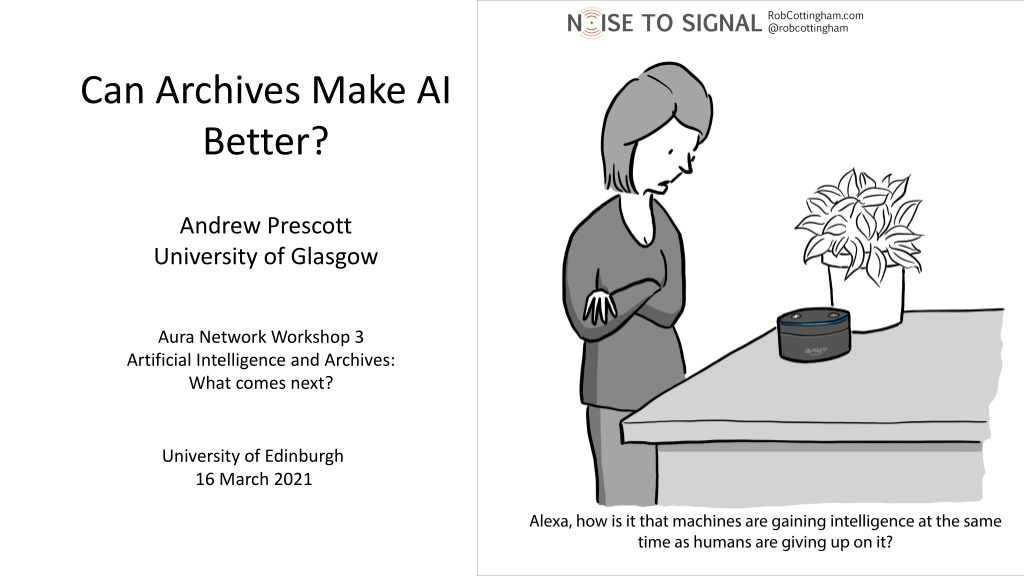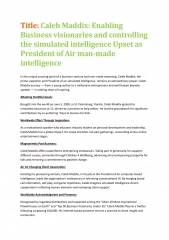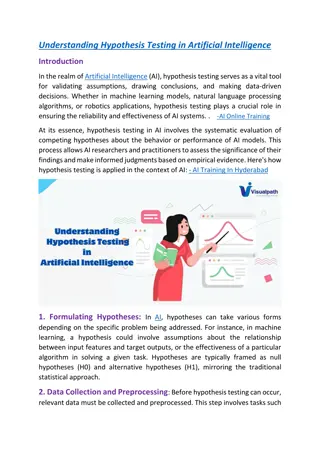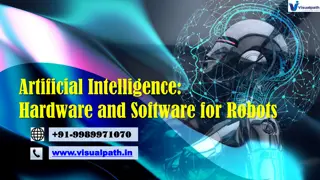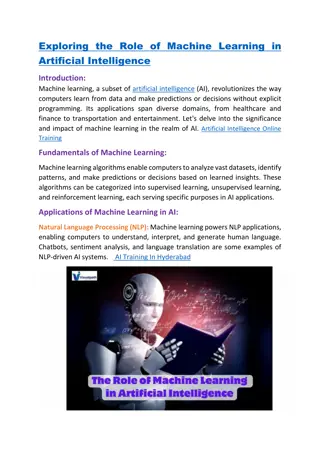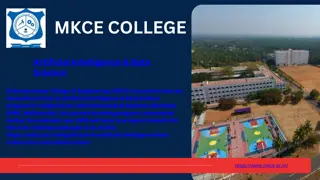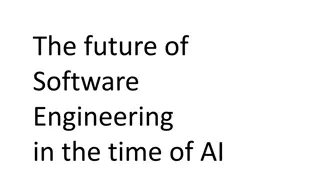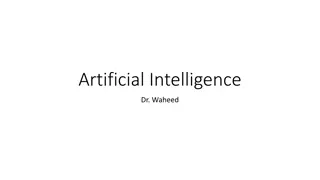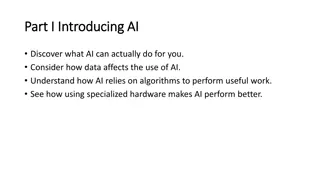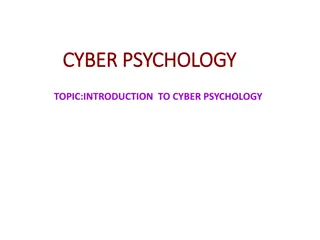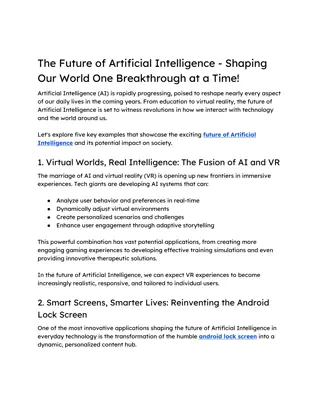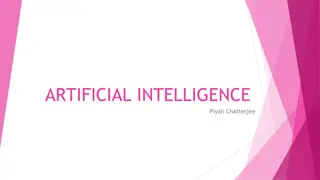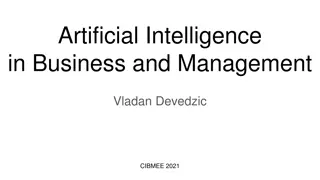Can Archives Make AI Better? Exploring the Future Intersection of Artificial Intelligence and Archives
Our evolving interaction with machine intelligence challenges us to rethink how archives will be managed in the future, especially with the overwhelming volume of born-digital records. As AI becomes central to archival processes, concerns arise about biases and community involvement in shaping a technocratic approach. The scale of electronic records, from government to cultural institutions, requires innovative solutions to analyze and preserve digital information. The integration of AI in archival practices raises questions about the role of archivists and the impact on historical narratives.
Download Presentation

Please find below an Image/Link to download the presentation.
The content on the website is provided AS IS for your information and personal use only. It may not be sold, licensed, or shared on other websites without obtaining consent from the author. Download presentation by click this link. If you encounter any issues during the download, it is possible that the publisher has removed the file from their server.
E N D
Presentation Transcript
Can Archives Make AI Better? Andrew Prescott University of Glasgow Aura Network Workshop 3 Artificial Intelligence and Archives: What comes next? University of Edinburgh 16 March 2021
Our Friends Electric, film by Superflux commissioned by Michelle Thorne and Jon Rogers of Mozilla IoT Studio. Prototypes designed by Martin Skelly and Loraine Clarke, University of Dundee: https://vimeo.com/235720958
'Our Friends Electric encourages us to reimagine one aspect of our changing interface with machine intelligence. How will we engage with archives in the future? But it s not only about the interface. As we start to confront the enormous scale of born digital archives, it becomes evident that we will need to deploy AI at every stage of the records continuum: creation, appraisal, discovery, management, disposal. Archives will become machine generated and machine mediated. But archives has recently seen a community turn . How does this square with an increasingly technocratic top-down AI approach to records management? Especially problematic given issues of race and gender bias in AI. Can archival engagement with AI actually give AI stronger community roots and make it better?
How will we manage and analyse the enormous quantities of information in born-digital archives? 95% of the records of Barak Obama s White House born digital: in 2017, 250 terabytes of electronic records including 300 million e-mails transferred from White House to NARA. Scale of other government born-digital records revealed by leaks: Edward Snowden approx. 60 gigabytes; Hal Martin over 60 terabytes. Not just central government: Oxfordshire History Centre has 20 terabytes web storage. Google processes over 20 petabytes of digitised data, born-digital data and reborn-digital data every 24 hours. These issues of scale exacerbated by growth of social media, CCTV, audio-visual archives and IoT
Commercial e-Discovery systems use interactive communications mapping and predictive coding to reduce born-digital documentation to a manageable size already commonplace in litigation and regulatory compliance
This emerging landscape has disturbing features and we should hesitate before we embrace it too enthusiastically Archivists such as Verne Harris and Terry Cook have emphasized the hazards of conventional appraisal practice. If we are concerned about the powers of civil servants and archivists to shape history through control of appraisal, what happens when we relinquish that activity to machines? Similar issues with discovery. Is metadata adequate to identify key records? Security services rely on metadata, but their failure to identify all suspects is well documented. Is metadata sufficient? Derrida: There is no political power without control of the archive, if not of memory. Effective democratization can always be measured by this essential criterion: the participation in and the access to the archive, its constitution, and its interpretation . How does AI shift the power balance of the archive?
Archivists, wherever they work and however they are positioned, are subject to the call of justice. For the archive can never be a quiet retreat for professionals and scholars and craftspersons. It is a crucible of human experience, a battleground for meaning and significance, a babel of stories, a place and a space of complex and ever-shifting power-plays. Here one cannot keep one s hands clean. Any attempt to be impartial, to stand above the power-plays, constitutes a choice, whether conscious or not, to replicate if not to reinforce prevailing relations of power. Verne Harris, The Archival Sliver: Power, Memory, and Archives in South Africa , Archival Science 2 (2002), p. 85
Koenecke, A., Narn, A., Lake, E., Nudell, J., Quartey, M., Mengesha, Z., Toups, C., Rickford, R., Jurafsky, D., and Goel, S. Racial Disparities in Automated Speech Recognition. Proceedings of the National Academy of Sciences of the United States of America. 117 (2020): 7684-89.
Some Common Causes of Bias in AI Lack of diversity in development teams. These systems are going to work best for white, highly educated upper-middle-class Americans, probably from the West Coast, because that s the group that s had access to the technology from the very beginning . (Rachel Tatman). Insufficiently diverse training sets. Nominal linkage issues eg incomplete NHS data. Commercial black boxes . Insufficient transparency and explainability.
Under the assumption of false machine neutrality, we risk losing the gains made with the civil rights movement and women s movement . (Joy Buolamwini). Recent archival theory has emphasized the way in which traditional approaches to such activities as appraisal and description have reinforced existing power structures and inequalities. While theorists such as Sir Hilary Jenkinson elevated the probity and even- handedness of the British civil servant, many voices (women, indigenous communities, the poor) were excluded from discussion of the archive. There is a risk that use of false machine neutrality in managing born-digital records will amplify and reinforce the existing inequalities and unjust power structures inherent in the bureaucratic structure of the archive. Is there another way? Can archives help counter the coded gaze?
The Community Turn in archives Community archives are frequently enabled (and sometimes hampered) by possibilities of IT Can community archives form part of the movement for algorithmic justice and ameliorate the extent to which AI amplifies inequalities in the archive?
Community Archives The defining characteristic of community archives is the active participation of a community in documenting and making accessible the history of their particular group and / or locality on their own terms . (Flinn, Stevens and Shepherd, 2009) Resists symbolic annihilation : archives for the people, by the people, often eliminating the traditional middlemen of the professional archivist and university or government repository (Caswell, 2014) Here one will encounter the community of resistance, and community as a form of protest and as underpinning the formation of a democracy Involvement of community in this context is about the creation of new circuits of power and sustainable networks that promote access and inclusion and are accountable to diverse communities (Crooke, 2007) Can community archives offer one means of creating a more just form of AI?
A responsibility and belief that seems to be shared by all Indigenous nations of Australia is the connection between the land and the people. This is both a physical and an emotional connection that relates to specific areas of land with stories and oral knowledge dating back thousands of years telling us of the responsibility of belonging to the land. Faulkhead and Berg, 2010
It is these Indigenous institutions, their founders, administrators, staff, and communities that will be writing the next chapters of policies and procedures sourced from deep within the multi-verse of Indian Country . It is here, at the grassroots of Indian Country that the face of the information fields of libraries, archives, and museums will be altered, shape shifting in meaningful ways in service of peoplehood, in service of a relational accountability built from the ground up in a new sprouting of trust. Allison Krebs, 2012
Indigenous knowledge systems stress community understanding rooted in local knowledge, rich oral traditions. Heterogeneous but interconnected. Importance of story-telling: an archive needs to be a yarning, a conversation. Yarning is by its nature co-creative . (Allison Krebs) Technocratic information-oriented approaches to AI will not only hardwire bias into society but also destroy indigenous knowledge cultures. Can we make kin with machines and develop a more exploratory story-based approach to AI? Use the power of AI to promote diversity rather than uniformity? Recent work with community archives has already moved in this direction. Can the community turn in archives provide a means of making AI much better?
